Lebanon

LEBANON
Lebanon is a Middle Eastern state located on the shores of the Mediterranean Sea, covering an area of 10.5 thousand square meters. km. The capital is Beirut. The official language is Arabic.
According to the constitution, Lebanon is a parliamentary republic, and the model of state organization is designed to ensure equal access to power for all religious denominations. The highest legislative body is a unicameral parliament, elected by popular vote. The state is headed by the president, elected by the deputies. Executive power is exercised by the Council of Ministers.
The first settlements on the territory of Lebanon have been known since the Neolithic era. Later, at different times, these lands were part of Phenicia, the Roman Empire, the Caliphate, the Ottoman Empire, and were under the protectorate of France. The country finally gained its independence in 1943.
Population
The population of Lebanon is over 6 million people. The bulk (about 80%) are Lebanese Arabs, in addition, there are about two million refugees and temporary settlers, as well as foreign workers in the country. About 60% of the population is Muslim, and almost half of the local residents identify themselves as belonging to other confessions. This ethnic diversity is reflected in the traditions and culture of Lebanon. Many Lebanese speak at least 3 languages - Arabic, French, English. About 15 million more Lebanese live abroad.
Economy
Since the end of the twentieth century, the leadership of the Lebanese Republic has been pursuing a course towards economic reconstruction. The basis of the Lebanese economy is the service sector (its share in the structure of GDP is about 75%), industry (18%) and agriculture (5%). Most of the GDP is generated by the private sector. The main industries are energy, mining of minerals (limestone, iron ore, salt, sand, gravel), chemical (production of fertilizers, plastics, medicinal and cosmetic products) and light (textiles) industries, production of building materials. Natural gas reserves have been explored, and the potential for growth in the financial services industry is noted.
The agriculture of the Lebanese Republic was noted by experts as the industry with the highest labor productivity even on a global scale. Cereals, vegetables, fruits, sugar beets and tobacco are cultivated here. Winemaking is traditional, dairy production and animal husbandry are developing.
Transport
The length of Lebanon’s highways is about 7 thousand km. There are no domestic flights and rail links in the country, passenger transportation between cities is carried out by buses and minibuses, although most of the flights do not have permanent and clearly marked routes. Taxis are considered the most convenient means of transportation in urban areas. International flights are carried out from the capital airport. The three major seaports are mainly used by merchant ships and cruise ships.
Interesting
Lebanon has a warm Mediterranean climate, while snow in the mountains lays for several months. On the coast there are about 300 sunny days a year.
Cedar in Lebanon is considered a sacred tree, even its seeds are prohibited from being exported from the country.
The national currency is the Lebanese pound.
GMT: +3 hours (summer), +2 (winter).


